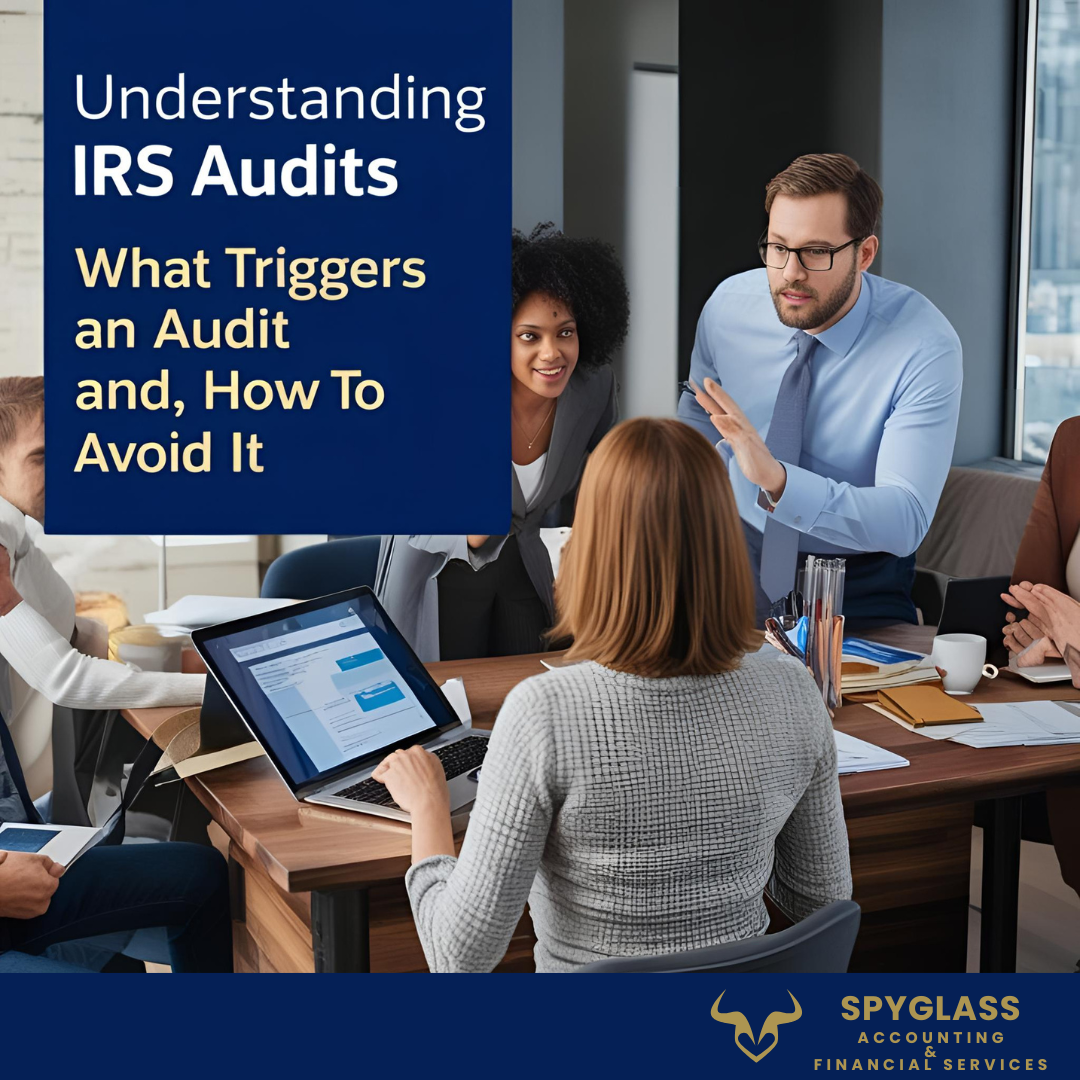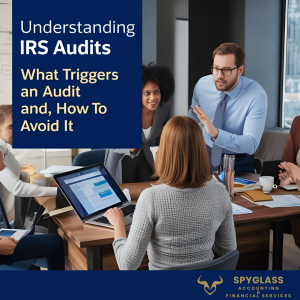Understanding IRS Audits: What Triggers an Audit and How to Avoid It
The thought of IRS audits can make even the most diligent taxpayer break into a cold sweat. While the chances of being audited are relatively low (less than 1% for most individuals), certain behaviors and financial practices can significantly increase your risk. Understanding what triggers IRS audits and how to avoid common pitfalls can help you stay compliant and stress-free.
Let’s dive into the key factors that could put you on the IRS’s radar and how you can steer clear of trouble.
What Triggers IRS Audits?
The IRS uses a combination of automated systems and human review to identify tax returns that may need closer scrutiny. Here are the top audit triggers to watch out for:
1. Missing or Underreported Income
The IRS receives copies of all your income-related documents, such as W-2s, 1099s, and even reports from cryptocurrency exchanges. If your tax return doesn’t match the income reported to the IRS, it’s a major red flag.
- What to Do: Double-check that all income sources are accurately reported, including freelance work, dividends, and even gambling winnings.
2. Excessive Deductions or Credits
Claiming an unusually high number of deductions or credits compared to others in your income bracket can raise suspicions. Common targets include:
- Charitable Donations: Large or disproportionate donations relative to your income.
- Business Losses: Consistent losses may lead the IRS to question if your business is legitimate.
- Earned Income Tax Credit (EITC): Frequently misused, making it a common audit target.
- What to Do: Only claim deductions and credits you’re entitled to, and keep detailed records to back them up.
3. High Income
While most taxpayers face a low audit risk, those earning over 500,000 annually are more likely to be audited. For individuals reporting over 10 million, the risk is even higher.
- What to Do: High earners should ensure their tax returns are meticulously prepared, especially if they have multiple income streams or complex investments.
4. Offshore Accounts and Assets
The IRS is particularly vigilant about offshore income and assets. Failure to report foreign accounts or income can lead to severe penalties.
- What to Do: File the required forms (e.g., FBAR) and report all foreign income accurately.
5. Large Cash Transactions
Cash payments or deposits of $10,000 or more must be reported via Form 8300. Unexplained large cash transactions can trigger an audit.
- What to Do: Keep detailed records of cash transactions and ensure they align with your reported income.
6. Amended Returns
Amending your tax return to lower your taxable income (e.g., retroactively claiming exclusions) can increase audit risk.
- What to Do: Consult a tax professional before amending your return to understand the potential implications.
7. Audit by Association
If you’re financially connected to someone being audited (e.g., a business partner or investor), the IRS may extend the audit to you.
- What to Do: Maintain clear and separate financial records to avoid being implicated in someone else’s audit.
How to Avoid IRS Audits
While you can’t eliminate the risk of an audit entirely, you can take steps to minimize it:
1. Report All Income
Ensure every dollar of income is reported, no matter how small. This includes wages, freelance income, dividends, and even side hustles.
2. Be Cautious with Deductions
Only claim deductions and credits you’re eligible for, and keep thorough documentation. For example:
- Charitable Donations: Save receipts and acknowledgment letters from charities.
- Business Expenses: Maintain detailed logs for mileage, meals, and other expenses.
3. Use Accounting Software
Modern accounting tools can help you track income and expenses accurately, reducing the risk of errors.
4. File on Time
Late filings can attract unwanted attention. If you need more time, file for an extension rather than missing the deadline.
5. Seek Professional Help
Tax professionals can help you navigate complex tax situations, ensuring compliance and reducing audit risk.
What to Do If You’re Audited
If you do receive an audit notice, don’t panic. Here’s how to handle it:
- Review the Notice: Understand what the IRS is questioning and gather the requested documents.
- Respond Promptly: Provide the necessary information by the deadline.
- Seek Professional Help: A tax attorney or CPA can guide you through the process and represent you before the IRS.
- Stay Organized: Keep all records and correspondence in one place for easy reference.
Final Thoughts
IRS audits don’t have to be a nightmare. By understanding what triggers an audit and taking proactive steps to stay compliant, you can significantly reduce your risk. Remember, the key to avoiding audits is accuracy, transparency, and good record-keeping.
If you’re ever unsure about your tax situation, don’t hesitate to consult a tax professional. At Spyglass Accounting and Financial Services, we’re here to help you navigate the complexities of tax compliance and keep your finances in order.
Stay informed, stay prepared, and keep the IRS at bay!

